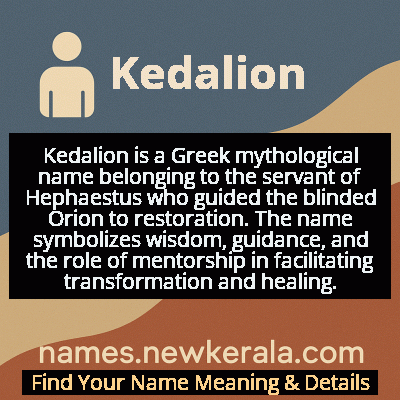Kedalion Name Meaning & Details
Origin, Popularity, Numerology Analysis & Name Meaning of Kedalion
Discover the origin, meaning, and cultural significance of the name KEDALION. Delve into its historical roots and explore the lasting impact it has had on communities and traditions.
Name
Kedalion
Gender
Male
Origin
Greek
Lucky Number
8
Meaning of the Name - Kedalion
Kedalion is a Greek mythological name belonging to the servant of Hephaestus who guided the blinded Orion to restoration. The name symbolizes wisdom, guidance, and the role of mentorship in facilitating transformation and healing.
Kedalion - Complete Numerology Analysis
Your Numerology Number
Based on Pythagorean Numerology System
Ruling Planet
Saturn
Positive Nature
Ambitious, efficient, realistic, and authoritative.
Negative Traits
Materialistic, stressed, confrontational, and can be overly ambitious.
Lucky Colours
Dark blue, black.
Lucky Days
Saturday.
Lucky Stones
Blue sapphire, amethyst.
Harmony Numbers
2, 4, 6.
Best Suited Professions
Business leaders, managers, financial services, law enforcement.
What People Like About You
Leadership, determination, organizational skills.
Famous People Named Kedalion
Kedalion of Greek Myth
Divine Servant/Guide
Guided the blinded Orion to the sunrise to restore his vision
Kedalion (Literary Character)
Mythological Figure
Featured in various retellings of Orion's myth as the clever servant of Hephaestus
Kedalion (Modern Interpretation)
Symbolic Figure
Represents the archetype of the wise guide and mentor in modern mythological studies
Name Variations & International Equivalents
Click on blue names to explore their detailed meanings. Gray names with will be available soon.
Cultural & Historical Significance
The significance of Kedalion extends beyond the literal narrative to represent the Greek ideal of the guide who facilitates transformation through indirect means. Unlike major gods who might intervene directly, Kedalion represents the human-scale wisdom that enables heroes to help themselves. His role as Hephaestus's servant further connects him to craftsmanship, ingenuity, and the practical application of knowledge. In broader Greek cultural context, Kedalion symbolizes the importance of mentors who provide direction rather than solutions, reflecting the pedagogical values that were central to Greek philosophical and educational traditions.
Extended Personality Analysis
Individuals named Kedalion are often perceived as possessing a calm, observant nature with a strong inclination toward mentorship and guidance. They typically exhibit patience and strategic thinking, preferring to help others find their own solutions rather than providing direct answers. This aligns with the mythological Kedalion's approach of guiding Orion toward healing rather than curing him directly. Their personality tends to be characterized by quiet confidence and practical wisdom, making them natural advisors and problem-solvers in their social and professional circles.
Kedalion-named individuals often demonstrate remarkable resilience and adaptability, able to navigate challenging situations with composure. They possess an innate understanding of timing and process, recognizing that true growth often requires gradual development rather than immediate solutions. Their communication style tends to be thoughtful and precise, and they excel in roles that require mediation, teaching, or strategic planning. While they may not seek the spotlight, their influence is often profound and lasting, much like their mythological counterpart who played a crucial role in a hero's journey despite his minor status in the pantheon.
Modern Usage & Popularity
In contemporary times, Kedalion remains an exceptionally rare name, primarily used by parents with strong interests in Greek mythology or classical studies. Its usage is almost exclusively found in academic circles, among classicists, or by those seeking unique mythological names with deep symbolic meaning. The name has never appeared in popular baby name registries and maintains an obscure status, which appeals to parents looking for distinctive names with classical roots. Recent trends show slight increases in mythological name adoption, but Kedalion remains at the far end of this spectrum due to its complexity and unfamiliarity to most modern audiences. Its modern usage is largely symbolic rather than practical, serving as a connection to classical wisdom traditions rather than following naming conventions.
Symbolic & Spiritual Meanings
Kedalion symbolizes the archetype of the guide and mentor who facilitates transformation through wisdom rather than direct intervention. Metaphorically, the name represents the concept of 'enabling guidance' - the idea that true help often comes in the form of direction and support rather than solutions. It embodies the journey from darkness to enlightenment, mirroring the mythological narrative of leading a blinded hero toward healing light. The name also carries connotations of craftsmanship and practical intelligence, reflecting Kedalion's association with Hephaestus's workshop, suggesting that wisdom combined with skilled action can overcome even the most challenging obstacles. In broader symbolic terms, Kedalion represents the transformative power of proper guidance and the importance of mentors in personal growth and achievement.

